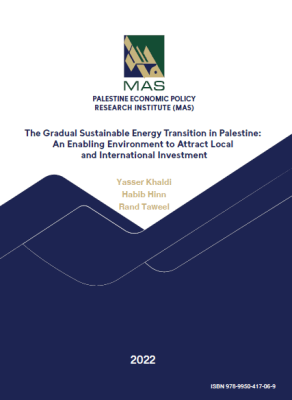The Gradual Sustainable Energy Transition in Palestine: An Enabling Environment to Attract Local and International Investment
Traditionally, the work of the Palestine Economic Policy Research Institute (MAS) focused on macroeconomic and social affairs. However, in recent years, the Institute has paid more attention to examining issues related to economic infrastructure, including the periodic coverage of these issues in the Quarterly Economic Monitor. MAS is aware of the importance of finding sustainable, national solutions to almost complete dependence on importing electrical energy from Israel, given that the issue of renewable energy has become a priority for government, for the Palestinian Energy Authority, and for other concerned parties. This comprehensive study discusses ways of gradual transition towards renewable energy in Palestine. It seeks to identify and
analyze the elements required to reach an environment conducive to encouraging and stimulating local (and international) investment in renewable energy projects in Palestine. This requires developing an analytical framework for the emergence of such an enabling environment, allowing for investment in renewable energy and compatible with the different phases of investments in this sector. The study also presents a set of policies, interventions and business models that enable the renewable energy sector and reduce dependence on Israel in the field of electrical energy.
The study concluded that the components of the investment environment in the Palestinian energy sector are incomplete. There are numerous geopolitical and internal factors that distance investors and independent energy producers from engaging in this sector, despite their willingness and financial capabilities. The priority of government and its institutions remains focused on the traditional energy sector, and the government’s measures are still unable to reduce risks associated with investments in renewable energy projects. For example, sovereign guarantees are not issued for renewable energy generation plants.
Both centralized and decentralized efforts should act as transitional pathways towards sustainability, in parallel with each other. Centralized efforts should
focus on long-term energy security, while decentralized efforts focus on rapid gains in implementing renewable energy, through covering growing demand at affordable prices. As is the case with MAS research, the subject of this study
was selected in response to the interests and needs of the Palestinian Energy Authority, and in recognition of the importance of providing public policies and programs with information, accurate scientific analysis and expert consultation.
Last but not least, MAS would like to thank Dr. Yasser Khaldi and researchers Habib Hinn and Rand Tawil for their efforts in preparing this study, and to the Palestinian Energy and Natural Resource Authority (PENRA), the Palestinian Electricity Regulatory Council (PERC) and the Investment Promotion and
Industrial Estates Agency (PIPA) for their cooperation with the research team and providing all the necessary information for the study. We also extend our
thanks to the Arab Fund for Economic and Social Development for financing.
this study, and for their continuous support to MAS, and its efforts to develop and advance the Palestinian economy.

